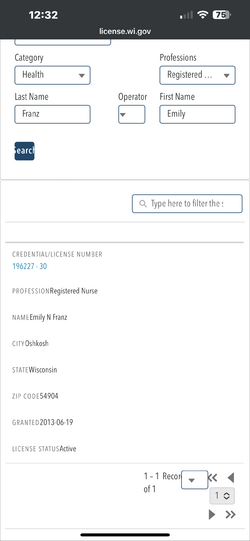Wisconsin’s Professional Assistance Procedure (PAP) is a program established to help healthcare professionals, including registered nurses, who are dealing with issues related to substance abuse or mental health. The program aims to provide an alternative to formal disciplinary action by focusing on rehabilitation and the safe return of the professional to practice. Here’s a detailed overview:
1. Purpose and Structure of PAP
• Rehabilitation-Oriented: PAP is designed to support professionals in receiving treatment and monitoring, with the goal of helping them overcome substance use or mental health issues.
• Voluntary Participation: The program is voluntary, and the healthcare professional must agree to participate and comply with its terms, such as undergoing treatment, regular drug testing, and monitoring.
• Non-Disciplinary Nature: Unlike formal disciplinary proceedings, PAP is considered a non-disciplinary, confidential program that does not involve public punishment or penalties.
2. Confidentiality and Public Records
• Not Part of Public Record: Participation in PAP is confidential. If a nurse or other healthcare professional is accepted into the program and successfully completes it, there is typically no public record of the incident or the PAP involvement. The goal is to protect the professional’s privacy while ensuring public safety through monitored rehabilitation.
• No Public Reporting: Because PAP is not considered a disciplinary action, it does not show up on the Wisconsin Department of Safety and Professional Services (DSPS) public records or in online license lookup tools. This protects the professional from having their participation disclosed to the general public.
3. Conditions for Maintaining Confidentiality
• Successful Completion: Confidentiality is maintained as long as the participant complies with all program requirements and completes the program successfully. This means the nurse’s record will not indicate any issues related to their participation.
• Non-Compliance: If the nurse fails to meet the program’s requirements or withdraws from PAP, the case may then be referred to the Board of Nursing for formal disciplinary action. At that point, any disciplinary measures taken would become part of the public record.
4. Impact on Professional Life
• Employers: Depending on the specifics of the program, a nurse may need to inform their employer of their participation, especially if certain practice restrictions are part of their monitoring. However, this remains a private matter between the nurse, their employer, and the Board.
• Safe Practice: PAP ensures that healthcare professionals can continue practicing safely while addressing their issues, minimizing disruption to their careers while protecting patients. [\spoiler]
neg



